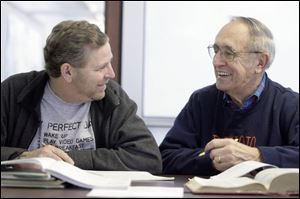
More volunteer tutors needed to change lives: locally, literally
1/5/2009
Henry Hartford of East Toledo, left, gets help learning how to read from retired University of Toledo professor Bob Niedzielski at the Read for Literacy program. At least 50 more volunteer tutors are needed.
The Blade/Andy Morrison
Buy This Image
When you can't read, it helps to have a good memory.
That was how Henry Hartford of East Toledo said he managed being illiterate for most of his 51 years.
Unable to decipher addresses or street signs, Mr. Hartford had to memorize landmarks or buildings when navigating around. He also learned to recognize the shapes of common words and phrases like "door" or "miles per hour" without ever comprehending the jumbled letters.
But eventually for Mr. Hartford, now a student in the Read for Literacy program in Toledo, memorizing shapes and carrying "cheat sheets" of words to work was no way to live life.
He enrolled in the adult literacy program nearly two years ago, and with one-on-one, twice-weekly tutoring from Bob Niedzielski, 72, a retired University of Toledo chemistry professor, Mr. Hartford is making steady progress toward his goal: obtaining a General Educational Development (GED) diploma, a high school equivalency degree which typically requires a 10th-grade reading ability.
With a waiting list that recently jumped to 46 people, the Read for Literacy program has an immediate need for 50 volunteers to tutor adult students.

Reading student Henry Hartford, left, and his tutor, Bob Niedzielski, share a laugh during their session at the main library in downtown Toledo.
There's a particular need for volunteers who know some Spanish, as a growing number of the program's English as a Second Language students speak hardly any English, Executive Director Jim Funk said.
Because many of these ESL students are parents, teaching them how to speak and read English gives their children a head start. "If we have people in our community who can't read, it is in the community's interest to help them become better providers and better parents," Mr. Funk said.
Begun in 1986, the program enrolls about 1,300 participants, nearly all from Lucas County. The twice-a-week 90-minute tutoring sessions are free, but students are asked to buy their own course materials. "The logic is that if people make a [financial] commitment to it, that will help them be and remain committed," said Mr. Funk, adding that hardship assistance is available.
To give flexibility, the time and location of each lesson are decisions left to the 1,200 tutors and their students. Most meet at branches of the Toledo-Lucas County Public Library, including at Read for Literacy's headquarters on the second floor of the main library downtown.
While Mr. Niedzielski had formal teaching experience, many volunteers do not. Tutors receive training through the program's orientation workshops.
A retired secretary, Grace Recknagel, 86, of South Toledo, has tutored nearly 50 students since volunteering more than 20 years ago. She has five students - most tutors have just one - none of whom grew up speaking English at home.
They came to her with different skill levels. She recalled one Turkish woman who knew only the English word "hello" and who needed her husband to help translate Mrs. Recknagel's lessons for the first few weeks.
Mrs. Recknagel, who is widowed, said the volunteer work has made her retirement years highly rewarding. "It's what gives me a purpose to get up every day and know that I am helping someone," she said. "They bring a good joy to my life and they've become friends."
The waiting list grew by nearly two dozen students in October, an upsurge Mr. Funk attributes to more referrals by area social service agencies, as well as an increased number of ESL students who know very little English.
It appears some of these students immigrated from small towns and villages in southern Mexico or Nicaragua, and never received a proper education in their native Spanish.
Mr. Funk said he does not know the number of undocumented immigrants receiving tutoring. "We don't ask about that," he said. "They're here and their kids are in our schools, and we want their kids to read."
Most students come to the program with a specific goal, such as getting a better job, obtaining a GED, or being able to read to their children. There are a few elderly students who no longer have economic reasons to become literate, but really want to read the Bible, Mr. Funk said.
The program receives no government funding, and its roughly $200,000 budget derives from private donations, foundation grants, and proceeds from two fund-raisers: The Blade Corporate and Community Spelling Bee and the Amazing Race for Literacy.
Those interested in registering or learning more about becoming a tutor may call the Read for Literacy office at 419-242-7323.
Contact JC Reindl at:
jreindl@theblade.com
or 419-724-6065.